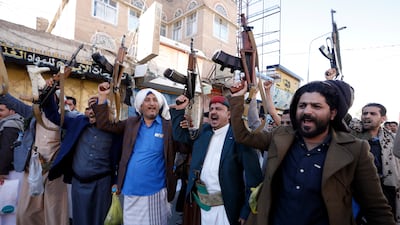In August, The National reported on an unlikely commodity being sold by impoverished Yemenis – landmines.
When one of the world’s most heavily mined countries was hit by flooding, which unearthed thousands of the lethal devices, civilians risked their lives to gather them for sale on the black market. In one weapons market, landmines were going for an average of 5,000 Yemeni rials, or $20, each.
Such desperation is just one illustration of the dire situation and need to help Yemenis, and to find a political solution. It should have also been top of people's minds at the UN donor conference held in Geneva earlier this week. However, amid waning interest in the long-running conflict and the intense global focus on Ukraine, an aid target of $4.3 billion was missed.
This lack of financial engagement is not only ruinous for the estimated 17.3 million Yemenis in urgent need of assistance, it also reveals a wider failure to prioritise a conflict that is a source of serious regional instability and cross-border terrorism.
This week a study released by the Middle East Institute described how the main stumbling block to ending the conflict – the violent and disruptive Houthi militia – had late last year engaged in economic warfare to exhaust the Yemeni government’s financial resources “and provoke social unrest in government-held areas”.
It also described how the Houthis’ attacks on infrastructure revealed “the same strategic use of Iranian-supported non-conventional warfare tactics seen in their previous cross-border attacks into Saudi Arabia and the United Arab Emirates”.

In light of the movement’s attempts to destabilise those parts of Yemen outside its control, finding a way to even begin the process of reconstruction seems challenging. The rebels’ current demand for money, ostensibly to pay Yemeni civil servants’ salaries – despite stuffing the institutions under their control with loyalists – is perhaps only slightly less obstructive to peace than their call for Houthi fighters and fellow travellers to receive payments, something that would, according to the Middle East Institute “perpetuate the cycle of conflict and bolster both their forces and their transnational allies”.
The Houthis’ behaviour, like that of other Iran-backed militants elsewhere in the region, reveals a propensity to thrive on conflict but falls abysmally short when it comes to the difficult business of making peace or even helping the people living under their rule.
Some countries have shown a commitment to helping Yemenis and the institutions under the control of their legitimate government. The UAE has so far provided Yemen with $6.6 billion in aid and a $300 million deposit for the Central Bank in Aden to bolster the country's economy. Last week Saudi Arabia deposited $1 billion into the Central Bank to support an economic reform programme and has provided billions of dollars of support for years.
What this week’s donor conference has made clear is that a sticking-plaster approach to Yemen – in which aid conferences do not tackle the root of the problem – is not enough. Some participants in the Geneva talks made clear the need for a change in approach.
Yemeni Prime Minister Maeen Abdulmalek Saeed told attendees that “ending the humanitarian crisis starts with ending the war.” UN Secretary General Antonio Guterres said the aid being pledged “saves lives but it cannot resolve the conflict itself”.
And Minister of State Noura Al Kaabi told the Geneva event that the time had come “to shift our focus from managing the conflict to finding a solution to it”.
This month will mark the eighth anniversary of the Arab coalition’s intervention into Yemen in response to calls from its government for help. With a clear-sighted view of the Houthis being a roadblock to peace, and a renewed commitment to end the festering instability on the Arabian Peninsula, with luck this year’s donor conference could be one of the last.


